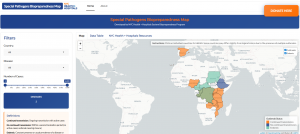The WT Grant Foundation and the Spencer Foundation have jointly awarded the Urban Food Policy Institute at the CUNY Graduate School of Public Health and Health Policy (CUNY SPH) a grant to study successful strategies for expanding enrollment, benefits, access, and impact of food benefit programs such as SNAP, WIC, and School Meals in response to the COVID-19 pandemic.
In partnership with Hunger Free America, a national direct service and advocacy group that seeks to ensure that all Americans have sufficient access to nutritious food, the Institute will produce and disseminate evidence that assists policymakers and advocates to use expansions of public food programs triggered by COVID-19 to reduce child and youth food insecurity through local, state, and federal programs.
Food insecurity has been a persistent problem in the U.S., and the COVID-19 epidemic and its economic consequences have pushed millions of additional children and young people in the U.S. into food insecurity, jeopardizing their well-being and health. Recent research indicates that, as of April 2020, more than one in five households in the United States and two in five households with children 12 years and younger were food insecure. Thus, new federal, state, and city resources allocated to reducing food insecurity resulting from the COVID-19 pandemic and its economic consequences provide an opportunity for the United States to test innovative approaches that can realize the elusive goal of implementing public policies that can end food insecurity and hunger among U.S. children.
Since 2000, local, state, and national governments in the United States have modified federally-funded public food programs such as SNAP, WIC, and school feeding programs in response to human, natural, and economic disruptions, including in response to COVID-19. They have changed eligibility criteria, increased funding for benefits, expanded outreach and education, facilitated enrollment and re-certification, and applied new technologies such as EBT and online enrollment for SNAP and WIC. Although a robust body of evidence on these initiatives exists, they have not been systematically summarized and assessed for their relevance to the current pandemic, nor organized to be useful for policymakers and advocates.
“This project will allow our Institute to bring to policy makers and advocates the extensive research and practice-based evidence on what works to enable expanded public food programs to ensure that hungry and food insecure children get the food they need,” said Nicholas Freudenberg, Distinguished Professor of Public Health at CUNY SPH and director of the CUNY Urban Food Policy Institute.
A key part of the project will be working with Hunger Free America, who will use evidence produced through this project to create educational materials, messages, and strategies that can be used to educate and inform advocates and policy makers on the relevant lessons from previous emergency responses.
“The United States is the only western industrialized nation with this massive level of child hunger,” said Joel Berg, CEO of Hunger Free America. “Yet we know to be well educated and well read, children must be well fed. This project will help use the new attention to child hunger triggered by the COVID-19 pandemic to ensure that expansions results in fewer food insecure children.”
The CUNY Urban Food Policy Institute provides evidence to inform urban and municipal food policies that make equitable access to healthy, affordable food a priority and promote intersectoral perspectives that link nutrition, health, and sustainable community and workforce development. The Institute engages CUNY faculty and students in food policy research and action.
Hunger Free America is a nonpartisan, national nonprofit group working to enact the policies and programs needed to end domestic hunger and ensure that all Americans have sufficient access to nutritious food. HFA has a significant track record of food policy successes that promote equity within the food system, including effectively encouraging Congress to enact Pandemic EBT program, New York City to expand the school breakfast program, and New York State to end the practice of fingerprinting SNAP applicants.
The WT Grant Foundation supports research to improve the lives of young people in the areas of reducing inequality, improving the use of research evidence, connecting research, policy, and practice, and improving youth services in New York City. The Spencer Foundation invests in education research that cultivates learning and transforms lives and has been a leading funder of education research since 1971 and is the only national foundation focused exclusively on supporting education research.
The CUNY Graduate School of Public Health and Health Policy (CUNY SPH) is committed to teaching, research, and service that creates a healthier New York City and helps promote equitable, efficient, and evidence-based solutions to pressing health problems facing cities around the world. For more information, visit sph.cuny.edu.
For more information contact Katherine Tomaino, Director of Evaluation, CUNY Urban Food Policy Institute, at Katherine.Tomaino@sph.cuny.edu.




